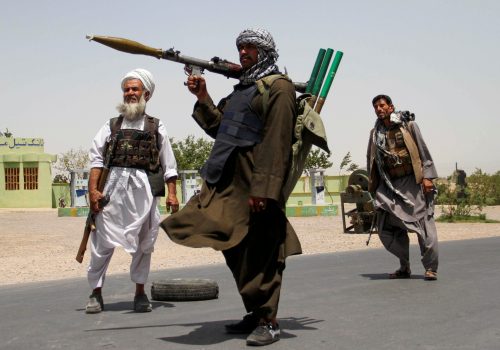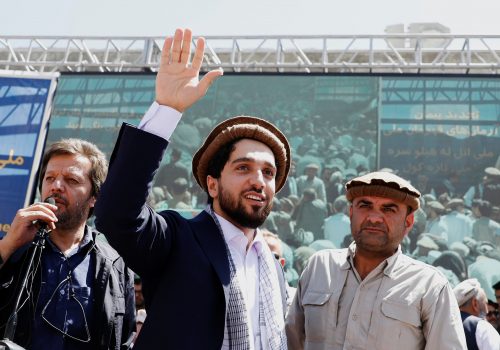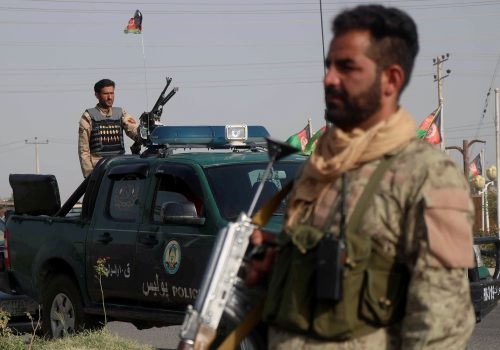FAST THINKING: The Taliban take three major cities. Is Kabul next?
JUST IN
The dominos keep falling. This week the Taliban seized control of Kandahar and Herat, Afghanistan’s second- and third-largest cities, as well as Lashkar Gah, the capital of Helmand province in the south. The Afghan government appears to be on the brink of collapse, with the Taliban now controlling all but three major cities. That’s led the Pentagon to deploy thousands of troops to prepare to evacuate US embassy personnel and others from the capital. Is the fall of Kabul inevitable? Will terrorists enjoy a safe haven once again? Our Afghanistan experts are here to chart the endgame.
TODAY’S EXPERT REACTION COURTESY OF
- Omar Samad (@OmSamad): Nonresident senior fellow at the South Asia Center and former Afghan ambassador to France and Canada
- Irfan Nooruddin: Director of the South Asia Center
- Nilofar Sakhi (@NilofarSakhi): Nonresident senior fellow at the South Asia Center and scholar who has worked on Afghan peace processes
Decision time
- The fall of one Afghan city after another shows that “the Taliban face almost no resistance,” Omar notes. “Sitting at the gates of Kabul, they now have two choices: Either continue with their military strategy of total conquest and hope that Kabul collapses from within or is captured,” he says, or “lay siege to the capital and make political demands to force [Afghan President] Ashraf Ghani’s administration to agree” to a political outcome favorable to the Taliban.
- Ghani, Omar adds, has three stark choices of his own: 1) “relinquish power” to a “broad-based interim government,” as the Taliban demands; 2) “try to resist Taliban advances and put up a fight, which would probably result in heavy casualties”; 3) reinforce the north under veteran commanders Abdul Rashid Dostum and Ata Mohammad Noor, “hoping to help Kabul prolong the stalemate” against the Taliban.
- The fall of Kabul is not a foregone conclusion, Irfan tells us, but “the damage is done.” While it’s still difficult to imagine the Taliban controlling the entire country, it’s now even harder to envision them being completely defeated by Afghan forces. “Any future therefore involves accepting Taliban control over large swathes of territory or a return to all-out civil war,” Irfan says.
What’s left behind
- This week’s sweeping gains have “created a sense of helplessness and hopelessness among educated and progressive-minded people of Afghanistan and will further increase the massive exodus” of Afghans from the country, Nilofar notes.
- But if that exodus includes a complete abandonment of the US embassy, Nilofar adds, “it will create a vacuum.” What then? “The Taliban is almost certain to give sanctuary to [al-Qaeda and ISIS], allowing them to re-emerge and reorganize themselves.”
- US President Joe Biden has described an “over-the-horizon” approach to fighting terrorism in Afghanistan after the withdrawal. But Nilofar says once terrorists have safe harbor again, those “tactics will no longer prove effective or practical,” which will force “the US to re-engage and rethink its counterterrorism strategy.”
Great-power game
- Nilofar points out that Herat “is the most important and strategic location for Iranian influence” in Afghanistan, and she therefore expects Iranian leaders to respond to the city’s seizure by building stronger trade and security ties with the Taliban. “As of today, Tehran will likely cement its policy with Afghanistan, recognizing the Taliban as the clear winner.”
- But a Taliban-Tehran alliance is no sure thing. “If the Taliban targets the Afghan Hazara Shiite community, a sectarian conflict is likely to ignite,” Nilofar predicts, which would prompt Iran to bolster its proxy militia, the Fatemiyoun Brigade, in Afghanistan.
- While Irfan expects statements of concern from Washington and European capitals about the fate of Afghanistan as the withdrawal of US and NATO forces concludes, what will really be on display is the sharp limits of American power, he argues. “The truth is that the voices that will be heeded most are those coming out of Pakistan, Iran, China, and Russia, all players that Washington has limited or no influence with,” he says.
- “Twenty years after its invasion of Afghanistan, the United States will not have a seat at the head table to influence that country’s future,” Irfan adds. “A more telling epitaph for American hegemony is hard to conceive.”
Further reading
Wed, Aug 11, 2021
Three paths for counterterrorism after the Afghanistan withdrawal
New Atlanticist By William F. Wechsler
As US forces withdraw from the country twenty years after 9/11, it is yet again terrorism—or a lack thereof—that could determine how President Joe Biden’s Afghanistan policy is remembered.
Wed, Aug 11, 2021
Ahmad Massoud: Look to local leaders to save Afghanistan
New Atlanticist By Kamal Alam
Just weeks before US troops fully withdraw from Afghanistan—and as Taliban fighters conquer more territory across the country—Ahmad Massoud says he is open to negotiations with the militants.
Fri, Aug 6, 2021
Don’t lose Afghanistan
New Atlanticist By
Given the Taliban’s behavior lately, US President Joe Biden’s decision to rapidly withdraw US forces from Afghanistan appears increasingly questionable. It's time for a course correction involving redoubled efforts to support the Afghan security forces—particularly through airpower, which is immediately critical.
Image: An internally displaced boy from northern provinces, who fled from his home due the fighting between Taliban and Afghan security forces, is comforted by his sister in a public park that they use as shelter in Kabul, Afghanistan, on August 10, 2021. Photo by a Reuters stringer.


